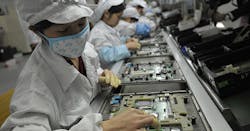Amazon Under Fire Again as China Factory Hires Teen Interns
Foxconn Technology Group fired two executives at a Chinese plant that assembles devices for Amazon.com Inc., responding to a labor group’s allegations it slashed wages and flouted laws to help deal with rising U.S. tariffs.
It’s the second time Amazon and the Taiwanese company, which makes many of the world’s most popular gadgets, have come under scrutiny for the treatment of workers at the plant in the central city of Hengyang. China Labor Watch last year criticized the facility, which produces Echo speakers and Kindle e-readers for Amazon, for relying on temporary workers -- including high school interns -- and overtime beyond limits set by law. Foxconn said in a statement on Friday it had dismissed the plant’s chief and head of human resources, and punished managers responsible for overseeing use of interns.
“Amazon and Foxconn responded that they would make improvements to the factory’s working conditions,” China Labor Watch said. “However, CLW’s 2019 investigation found that Foxconn’s working conditions did not improve, and instead deteriorated.”
Wages, which the labor group deemed last year too low to support a “decent standard of living,” were slashed by another 16% in 2019, the New York-based group said on Thursday, citing documents it obtained.
That salary hasn’t been enough to draw sufficient full-time workers to the factory, which requires more than 7,000 people to operate 58 assembly lines during the peak production period that begins in July. To fill the gap, Foxconn relied heavily on interns as young as 16 from vocational schools, some of whom were forced to work overtime, according to China Labor Watch.
One student cited in the advocacy group’s account is a 17-year-old computing major at a vocational high school. She started working at the plant in July and says her teacher told her the internship would require 40 hour workweeks spent placing a protective film over hockey puck-shaped Echo Dot smart speakers as they came down the assembly line.
A few weeks ago, she was asked to start putting in overtime to total 60 hours a week. When she complained to the manager of her production line, her teacher warned her that turning down the overtime could jeopardize her graduation, China Labor Watch said.
Foxconn said it recently conducted a review of its Hengyang facility and determined that the proportion of contract workers and student interns had on occasion exceeded legal thresholds, and that some interns had been allowed to work overtime or nights. “We were not in full compliance with all relevant laws and regulation,” the company said in an emailed statement Thursday.
“Effective immediately, the percentage of interns assigned to that facility will be brought into full compliance with the relevant labor law,” Foxconn said, adding it will also take immediate steps to ensure interns will no longer work overtime or nights.
The China Labor Watch report, which painted a grim picture of the factory’s working environment, said:
- Interns from local vocational schools accounted for more than 20% of the plant’s current workforce, double the levels permitted by law
- Such student workers were forced to work night shifts and overtime, in violation of the law, and that some interns were physically and verbally abused by teachers overseeing their work
- The factory used “dispatch workers” -- similar to temporary staff in the U.S. -- for around one in three positions at the plant, in excess of the 10% permitted by law
- Some 375 workers had been asked to work overtime on Sunday without receiving makeup days off, contrary to labor rules that stipulate at least one scheduled day off per week
Foxconn, which billionaire Terry Gou built into the world’s main assembler of iPhones, has grappled for years with allegations about mistreatment of a workforce estimated at a million-plus and drawn from China’s vast population of migrant laborers. In 2010, a rash of suicides prompted intense criticism, after which Foxconn pledged to overhaul its systems.
Last year’s report from China Labor Watch put the spotlight back on Foxconn, as well as on its customer Amazon, which sells an expanding range of consumer electronics from smart speakers and tablets to streaming devices. Amazon last year said it asked Foxconn to make changes after a March 2018 audit of the Hengyang facility uncovered violations regarding overtime and use of dispatch workers.
“We are urgently investigating these allegations and addressing this issue with Foxconn at the most senior level,” Amazon spokesman Sam Kennedy said in an emailed statement this week.
A recent audit of the Hengyang plant revealed six instances of workers who should not have been permitted to work overtime, Kennedy said. Foxconn corrected the issue and outlined steps “to ensure compliance moving forward,” he said.
Additional Amazon investigators arrived on site on Wednesday, and the company had started what it says will be “weekly audits of this issue,” Kennedy said. “We do not tolerate violations of our supplier code of conduct”
The latest report describes how managers struggled to offset a 33% fall in business during the January to September period, as U.S. President Donald Trump’s escalating tariffs on Chinese-made goods chilled demand for electronics and trade. Foxconn saw temp workers as an avenue to trim costs, China Labor Watch said in its report. It also cut overtime and base pay rates, and eliminated a hiring bonus and living subsidy.
About the Author
Bloomberg
Licensed content from Bloomberg, copyright 2016.
